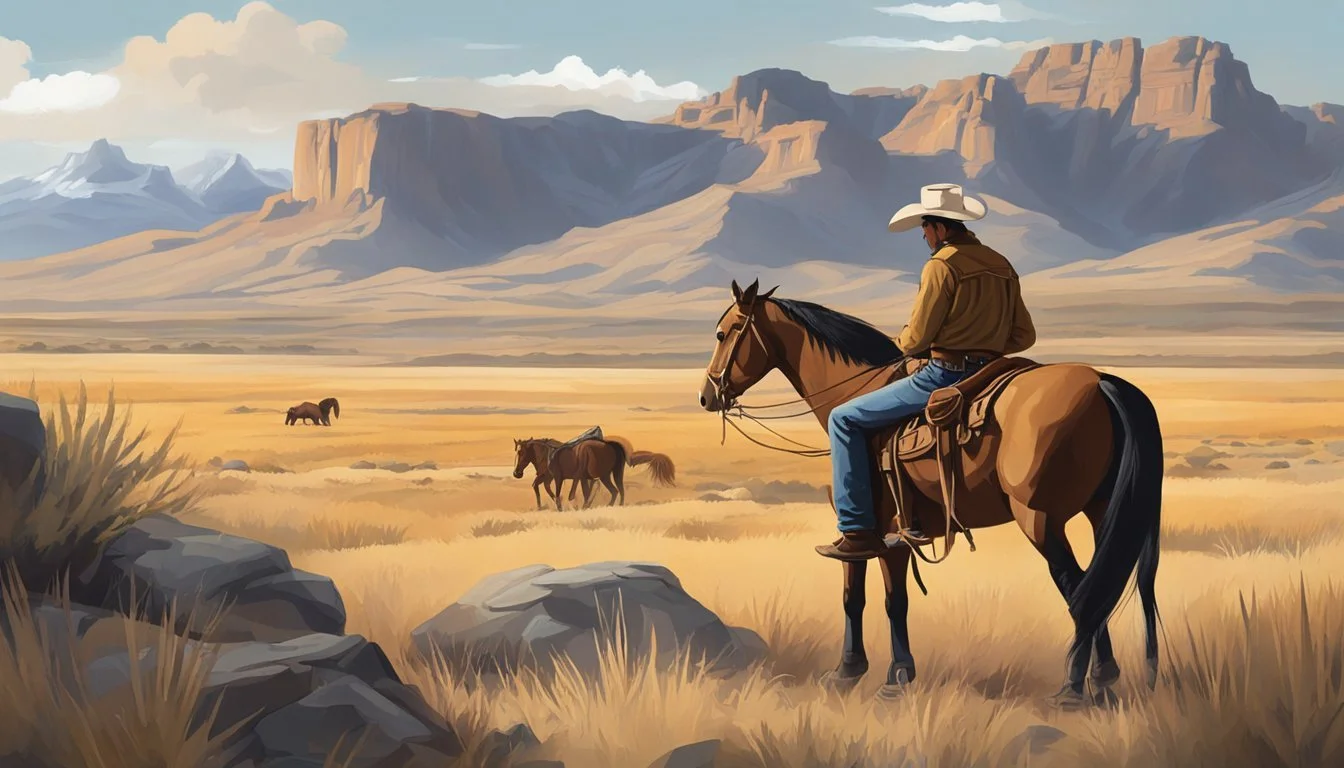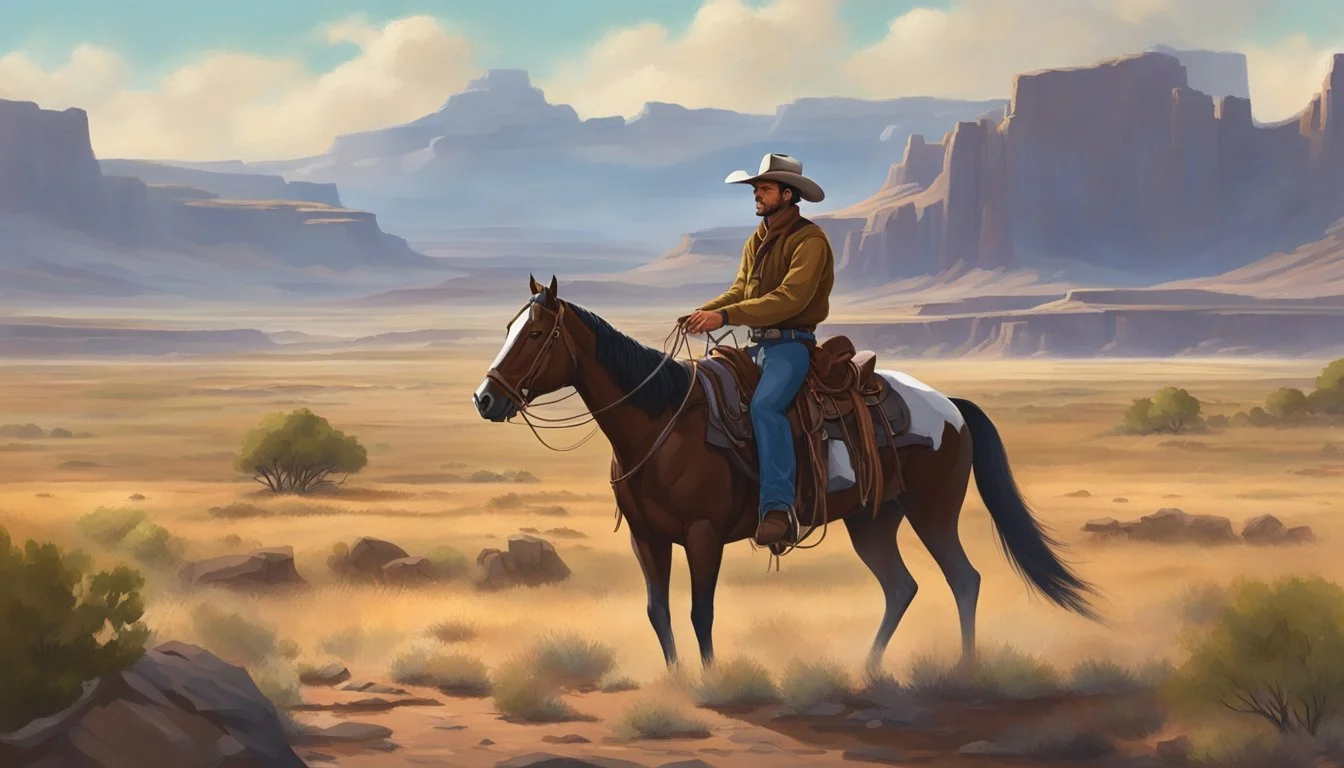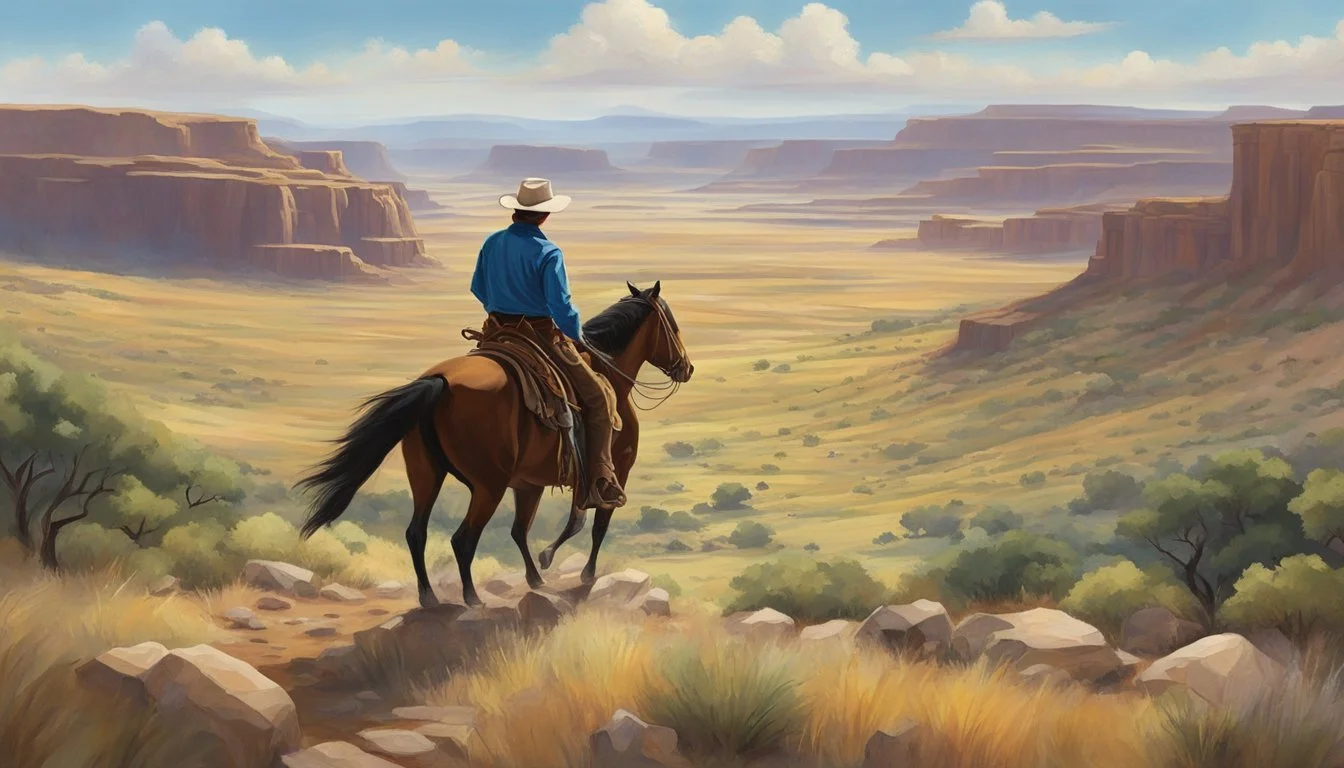The Spirit of the Texas Frontier
Delving into Cowboy Ethics and Timeless Philosophy
The Texas frontier embodies a rich tapestry of history and culture, where the figure of the cowboy stands as a powerful symbol of American values. Rooted in the cattle herding traditions of the late 19th century, cowboy culture has evolved to represent not just a way of life but also a code of conduct. Cowboys are often associated with traits such as bravery, resilience, and integrity, painting them as modern-day knights who were stewards of the open range. Their way of life dictated by necessity and survival on the frontier has given rise to what is commonly referred to as "cowboy ethics," principles that continue to resonate in contemporary society.
These ethics, grounded in the realities of cowboy life, encompass a set of values that prioritize honor, loyalty, and courage. They highlight an unwritten code that was necessary for survival and success in the untamed landscapes of Texas. The cowboy ethos has been romanticized in literature and film, yet the essence of these beliefs has practical applications that extend beyond the romantic image of the lone ranger or the heroic marshal in wild west tales.
The impact of the American cowboy is not confined to history books or mythic tales of the Wild West. Instead, it extends into the present, influencing everything from business practices to personal conduct. These values continue to shape notions of American identity and individualism, playing a critical role in the narrative of the United States and the spirit of its people. The philosophy that emerged from the Texas frontier hinges on a simple yet profound framework of ethics that tempers the rugged individualism of cowboy culture with a communal sense of responsibility and respect.
The Historical Context of Cowboy Ethics
Cowboy ethics originated during a turbulent era in American history, characterized by the rugged landscapes of the American West and the expansive cattle drives that were integral to the economy and culture.
Formative Years of the American West
The formative years of the American West were marked by a vast, untamed landscape. It was during the mid-19th century that cowboys became central figures in taming this wild frontier. Their ethics were rooted in the realities of frontier life, necessitating a strong sense of justice, resourcefulness, and perseverance.
Influence of Spanish Vaqueros
The foundation of cowboy ethics can be traced to the Spanish vaqueros, skilled horsemen and cattle herders who mastered the art of ranching in the New World. These early cowboys introduced roping, riding, and cattle management techniques that became the cornerstone of cowboy life.
Cowboy Life in the 19th Century
In the 19th century, cowboy life was demanding and dangerous, calling for a strict moral code to survive. Cowboys had to be honest, brave, and loyal to their fellow cowhands. Living in close proximity while coping with the threats on the trail forged a unique bond and a shared set of ethical values among them.
Settling of the West and Cattle Drives
The settling of the West was significantly influenced by cattle drives, as large herds were moved from Texas ranches to railroad hubs in Kansas. This migration required cowboys to develop a philosophy of respect for the land and the livestock, as well as for the multiple cultures and communities they encountered along the way.
Philosophy and Principles of Cowboy Ethics
Cowboy ethics serve as a guiding compass, embodying the spirit and resilience of the frontier life. This ethical framework, steeped in tradition, shapes character through unwavering principles like honor, integrity, and self-reliance.
Code of the West
The unwritten "Code of the West" emerged as a standard of conduct among cowboys. This code, while not legally binding, was a powerful force in the daily life on the frontier. It included aspects such as:
Fairness: Treating others equitably and justly.
Courage: Facing challenges without fear.
These principles became synonymous with the cowboy way of life, setting the expectations for behavior and interaction within the community.
Honor and Integrity
Honor and integrity are cornerstones of cowboy ethics. They represent:
A commitment to the truth: Cowboys are expected to be honest in their dealings and interactions.
Taking responsibility: They own up to their actions and their consequences.
This commitment to honor and integrity ensured that a cowboy's word was as respected as any written contract.
Loyalty and Camaraderie
Loyalty and camaraderie were vital among cowboys who often spent long periods in remote areas relying on one another. Key aspects included:
Trustworthiness: Maintaining confidence in each other's word.
Support: Aiding fellow cowboys during times of need.
These traits fostered deep bonds of friendship and trust, which were essential for survival and prosperity.
Resilience in the Face of Adversity
Cowboys were the epitome of resilience, often overcoming harsh conditions and unexpected hardships. They exhibited:
Mental toughness: Staying firm in their convictions despite adversity.
Physical endurance: Grit and determination to persevere.
Their ability to endure and thrive in the face of challenges was a testament to their robust spirit.
Self-Reliance and Independence
The values of self-reliance and independence are pivotal in cowboy ethics. Cowboys were:
Resourceful: Capable of solving problems with limited resources.
Self-sufficient: Able to manage their needs without external assistance.
This independence was not just practical but also a philosophical stance that emphasized personal responsibility and freedom.
The American Cowboy: Symbols and Significance
The image of the American cowboy is deeply rooted in the country's cultural panorama, symbolizing frontier values and a distinctive way of life. These symbols and their significance have permeated various spheres, from popular culture to specific traditions that continue to preserve the cowboy's legacy.
Cowboy Iconography in Popular Culture
In American popular culture, cowboy imagery is prevalent, often evoking the spirit of independence and resilience. Stetson hats, spurred boots, and the indispensable lasso have become quintessential symbols that identify the cowboy aesthetic. Icons like John Wayne, Roy Rogers, and Gene Autry have enhanced this imagery, becoming synonymous with cowboy virtues and style. Collectively, their influence on fashion, music, and even language underscores the enduring nature of the cowboy as an American symbol.
Hollywood and the Western Hero
Hollywood has played a critical role in crafting the image of the American cowboy as a stoic and heroic figure. Through films and television series, actors such as John Wayne embodied the archetype of the rugged individualist, reinforcing the cowboy's place in the American psyche. The Western hero, often portrayed as a moral compass in a lawless world, has been a central theme in cinematic narratives, influencing audiences' perceptions of courage, honor, and the American frontier.
Key Western Actors Role Impact John Wayne Defined the quintessential cowboy ethos of strength and honor Roy Rogers Popularized the singing cowboy and family-friendly cowboy image Gene Autry Brought cowboy life into homes through radio and early television
Rodeos and Their Role in Preserving Cowboy Traditions
Rodeos have become a cultural touchstone in maintaining and celebrating the traditions of cowboy life. These competitive events showcase skills directly derived from the practical demands of herding and managing cattle. Skills such as roping, steer wrestling, and bull riding highlight the athleticism and bravery inherent in the cowboy way of life. Rodeos not only serve as entertainment but also act as living history lessons, keeping the cowboy's spirit alive in modern American culture.
Living the Cowboy Way: Contemporary Reflections
While the image of the cowboy is often rooted in the past, their ethos and practices continue to shape contemporary American culture, particularly through modern rodeo, ranch stewardship, and the enduring influence of cowboy values.
Modern Rodeo and Horsemanship
Rodeos have evolved into a competitive sport that honors traditional cowboy skills, including horsemanship, which remains central to the cowboy identity. Today, events like bull riding, bronc riding, and team roping showcase the athleticism, strength, and agility of cowboys, connecting current generations to historical roots. Rodeo athletes continue to uphold the high standards of horse care and riding expertise that have been a hallmark of cowboy life.
Key Horsemanship Skills in Rodeo:
Equine care and health management
Precision in team roping and barrel racing
Mastery of bareback and saddle bronc riding
Ranches and Conservation Efforts
Modern ranches are not only centers for cattle and horse rearing but also play a vital role in land conservation. Ranchers today often embrace stewardship ethic, ensuring their lands are preserved for future generations. They balance the need for productive agricultural practices with measures to protect the local ecology, conservation of water sources, and maintenance of natural habitats.
Examples of Conservation Efforts on Ranches:
Sustainable grazing practices to prevent overuse
Restoration of native plant species
Protection of local wildlife corridors
Cowboy Culture in Modern Times
Cowboy culture endures, influencing modern American values of dedication to faith, family, and hard work. Across the United States, elements like cowboy poetry, music, and storytelling celebrate the spirit of the West and the integrity, honor, and courage intrinsic to the cowboy way of life. Communities still gather at events like rodeos, fairs, and parades, showcasing the living traditions that have shaped America’s cultural landscape.
Manifestations of Cowboy Culture Today:
Cowboy-themed festivals and educational exhibits
Dedication to the preservation of Western history and arts
Recognition of cowboy contributions to American identity
Contemporary reflections on the cowboy way reveal an ongoing legacy that is both preserved in tradition and renewed through modern interpretations and practices.
Parallel Ethics: Cowboy Philosophy in Business and Leadership
The unwritten cowboy ethics from the Texas frontier resonate deeply within modern business and leadership practices, underscoring the importance of a principled approach to achieving success and fostering effective leadership.
Applying The Code of Ethics to Modern Success
In the realm of business, the cowboy’s code of ethics parallels key factors that contribute to modern success. Core principles such as honor, integrity, and a person’s word being their bond reflect the value placed on honesty in today's corporate dealings. A commitment akin to a signed contract, where one's word signifies an unbreakable promise, promotes trust and reliability in professional relationships.
Leadership Lessons from Cowboy Culture
Cowboy culture teaches valuable leadership lessons. The emphasis on courage and resilience in the face of adversity inspire leaders to take on challenges with determination. The ethos, "lead by example," embodies the concept of authentic leadership, where actions speak louder than words and leaders are expected to walk the talk.
The Role of Community and Collaborative Work Ethic
The cowboy ethic reveres the power of community and the strength of collaborative efforts. Essential values such as loyalty, respect, and cooperation are crucial for building a cohesive team environment where individuals work towards common objectives.
Community: Nurtures a supportive network that leads to collective achievement.
Collaboration: Encourages pooling of skills and resources to meet shared goals.
Work Ethic: Cowboys' relentless work ethic is reflected in persistent efforts and diligence in business practices.
Cowboy Culture and Its Lasting Impact
Cowboy culture has transcended its historical origins to become a symbol of American history, influencing various societal and academic sectors around the globe.
The Global Reach of Cowboy Culture
Cowboy ethos and iconography have penetrated international culture, with the imagery of the cowboy hat, boots, and lifestyle capturing the global imagination.
Elements of cowboy culture, like rodeos and western wear, have found enthusiasts in continents far from North America, showcasing the culture's powerful and widespread appeal.
Institutional and Academic Interest
Historians and societal members extensively study the influence of cowboy culture on American history, using diverse access options such as digital archives and specialized libraries.
Institutions provide remote access to resources, enabling wider institutional access beyond those who hold a physical library card.
Legacy and Preservation of Cowboy History
Personal accounts and usage statistics in academic research highlight the significance of cowboy culture in shaping narratives about the American frontier.
Ongoing efforts to preserve the history of cowboys include living history museums and academic studies, ensuring the legacy of this cultural phenomenon remains intact for future generations.
Appendix: Resources and Further Reading
Books and Journals:
Cowboy Ethics:
"The Cowboy Ethics and Philosophy" offers insights into the unwritten code of conduct that shaped the Texas frontier. It serves as a fundamental reading to understand the ethos that cowboys lived by.
Imagery of the Texas Cowboy:
To explore archival photography and artworks, "The Imagery of the Texas Cowboy" provides a collection of visual history that can be accessed through institutional libraries.
Digital Libraries and Platforms:
Oxford Academic:
A platform where one can access scholarly articles on frontier history and cowboy ethics, utilizing institutional access.
Institutional Access Options:
IP-Based Access: Readers may connect to a variety of resources through IP recognition when within their institution's network.
Sign In Through Your Institution: For those with single sign-on capabilities, using your institutional credentials simplifies access.
Shibboleth/Open Athens Technology: This enables seamless institutional account management and secure log-in process.
Historic Sites:
They maintain an extensive archive and museum detailing the history of the Texas cowboy, which can be visited or contacted for educational resources.
Societies:
Sign in Through Society Site:
Various historical societies have their own depositories of information and might offer resources for research on the Texas frontier, accessible for society members.
Bulletins and Government Resources:
These often provide primary source documents and reports that offer a closer look at the history and evolution of the frontier, indispensable for those seeking a thorough understanding.
Note: Access to some of these resources may be subscription-based or require membership. Always check with your local library or institution for access to specific databases or archival materials.





